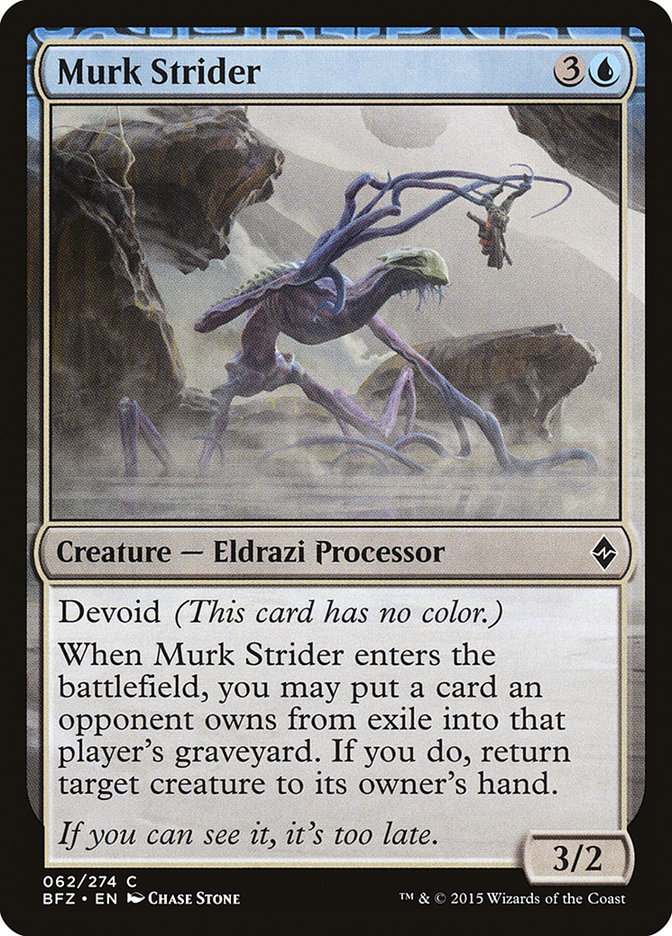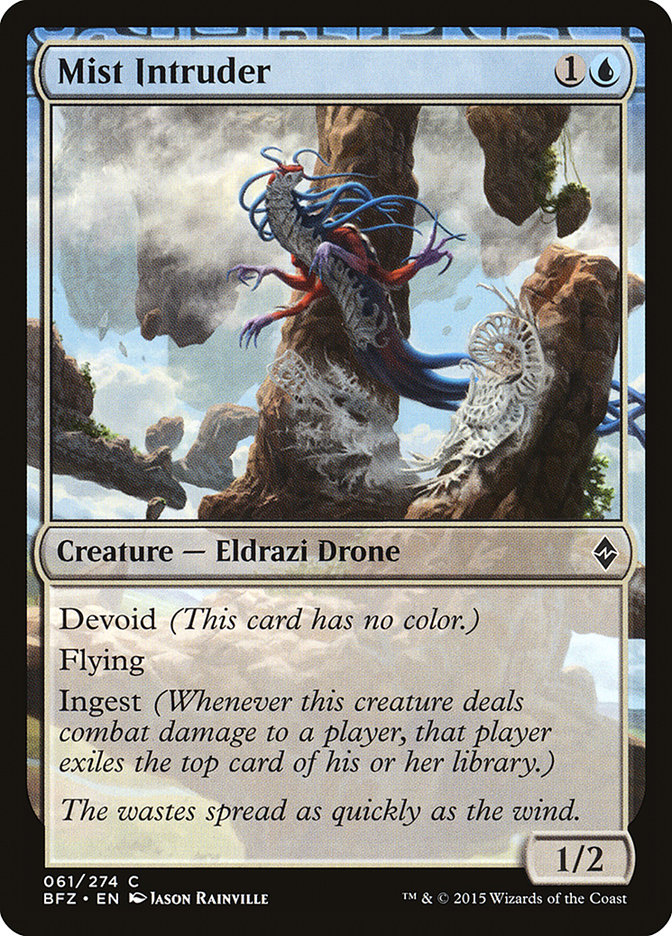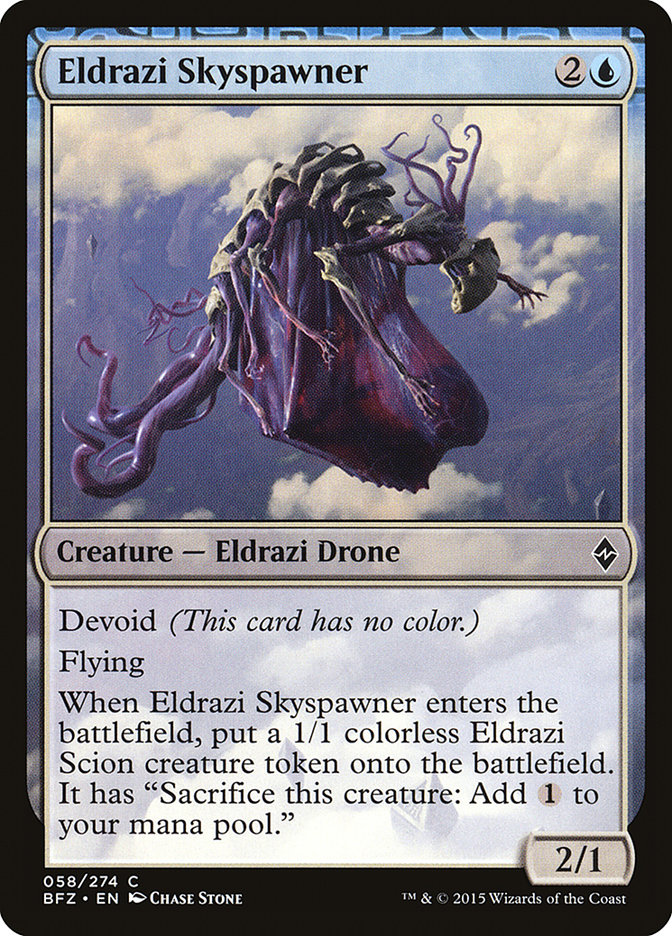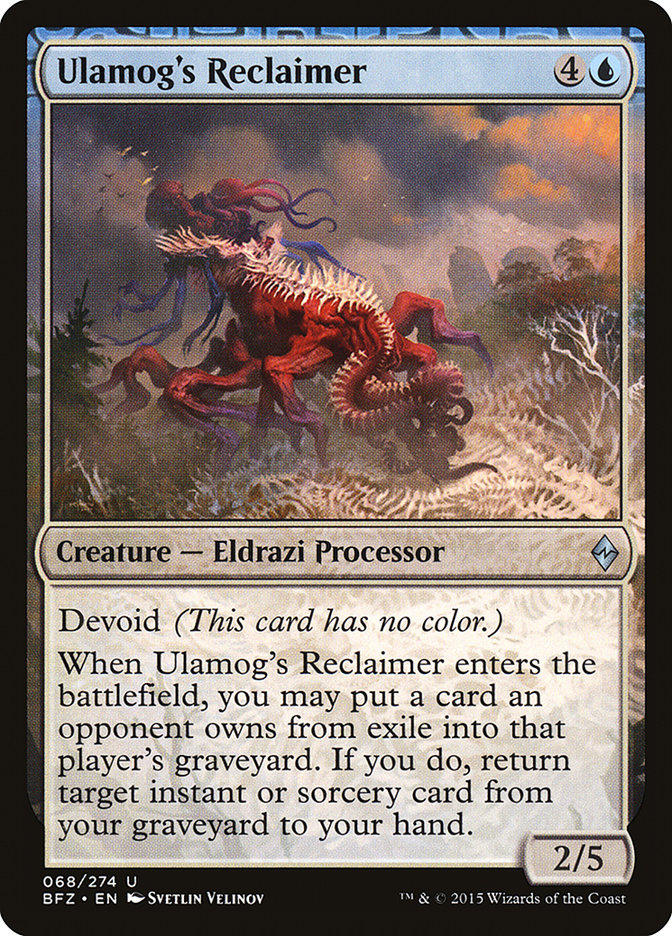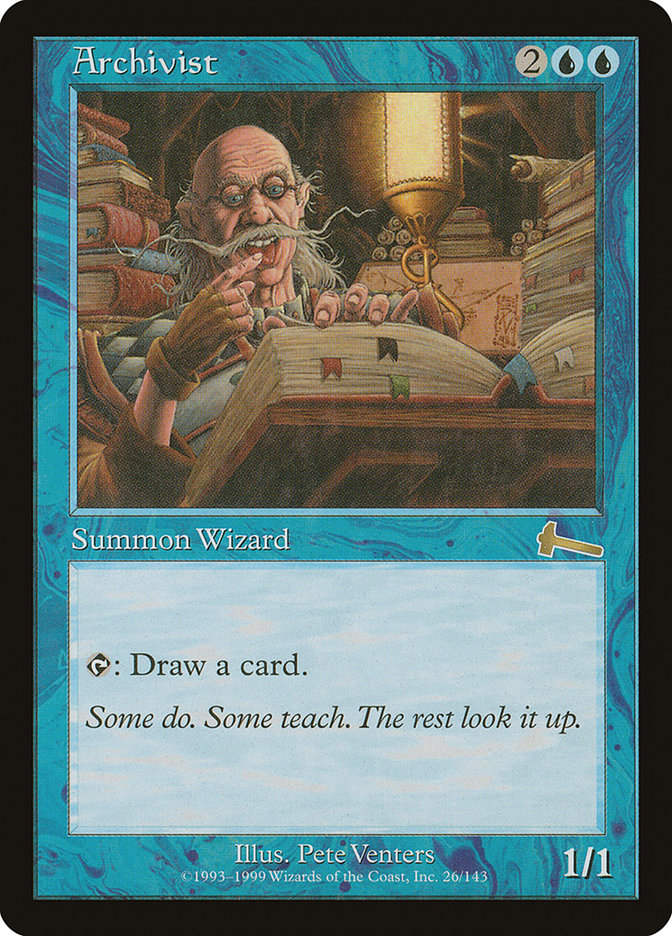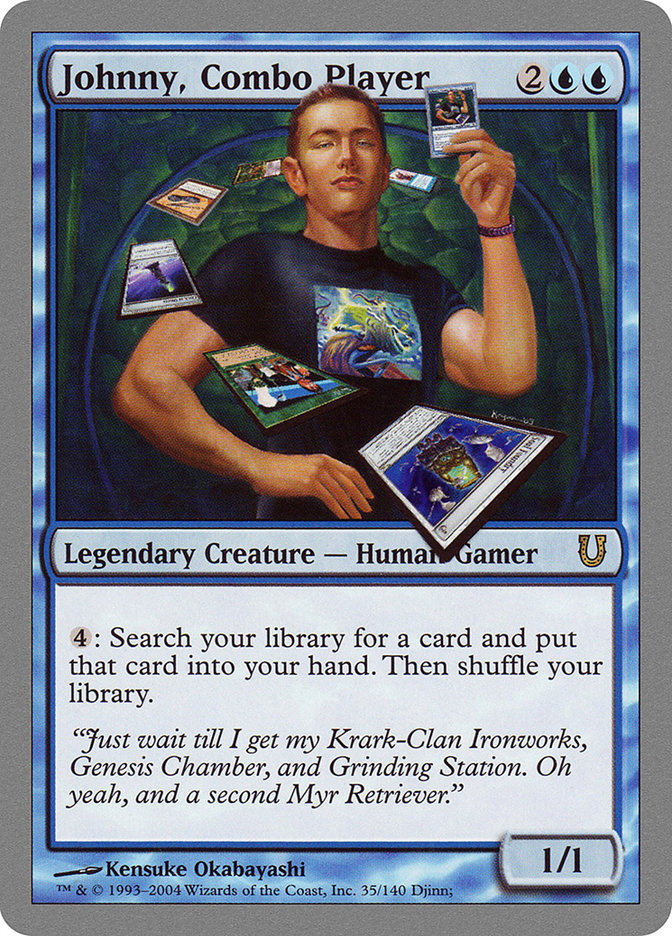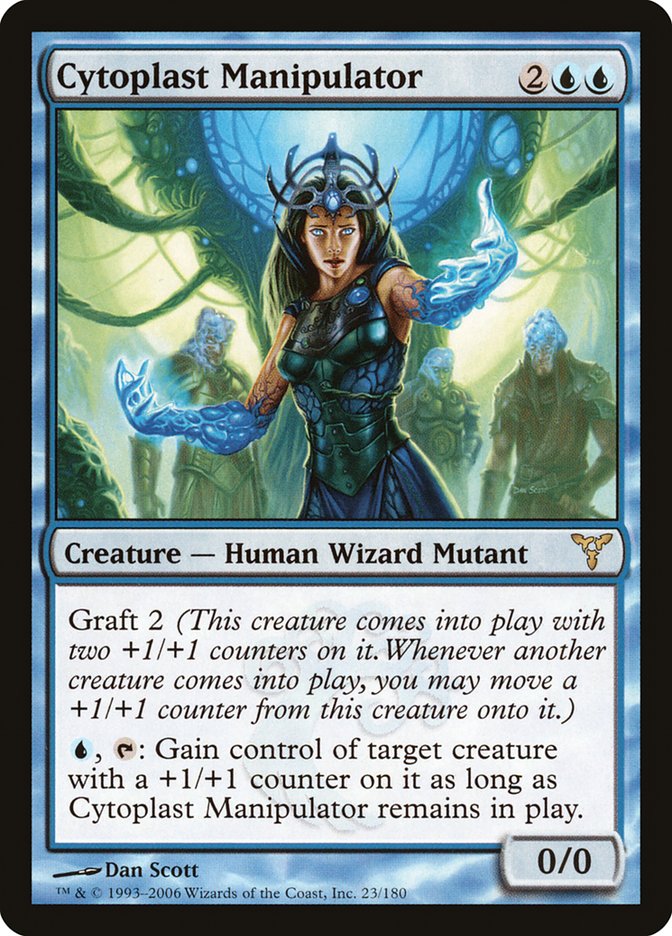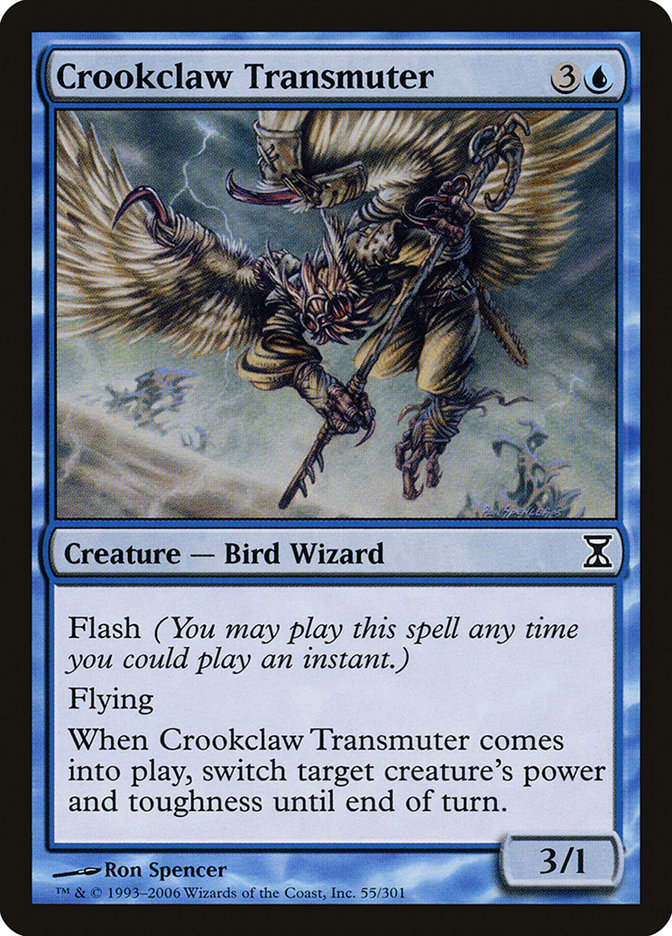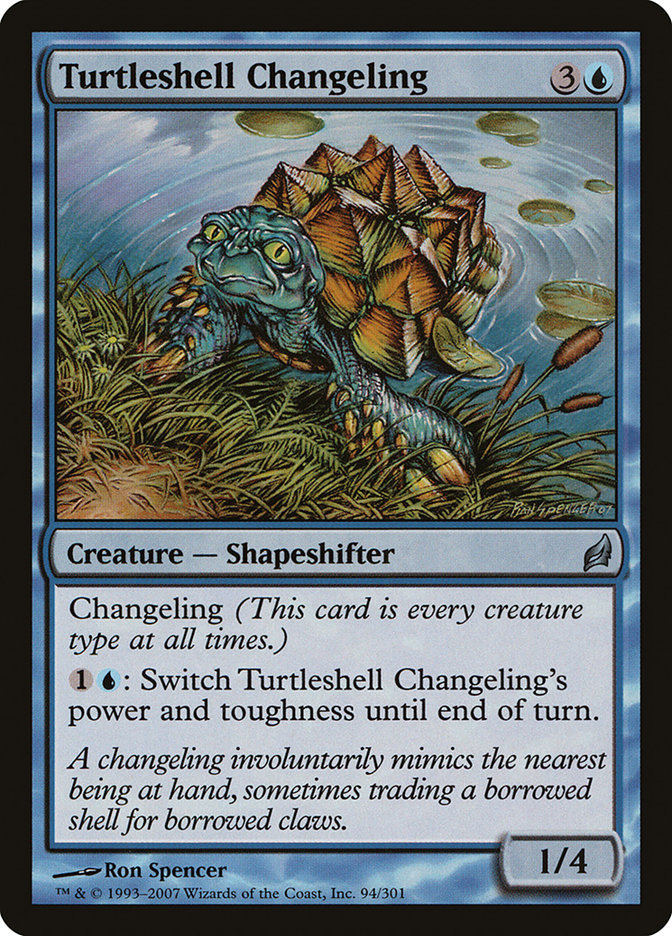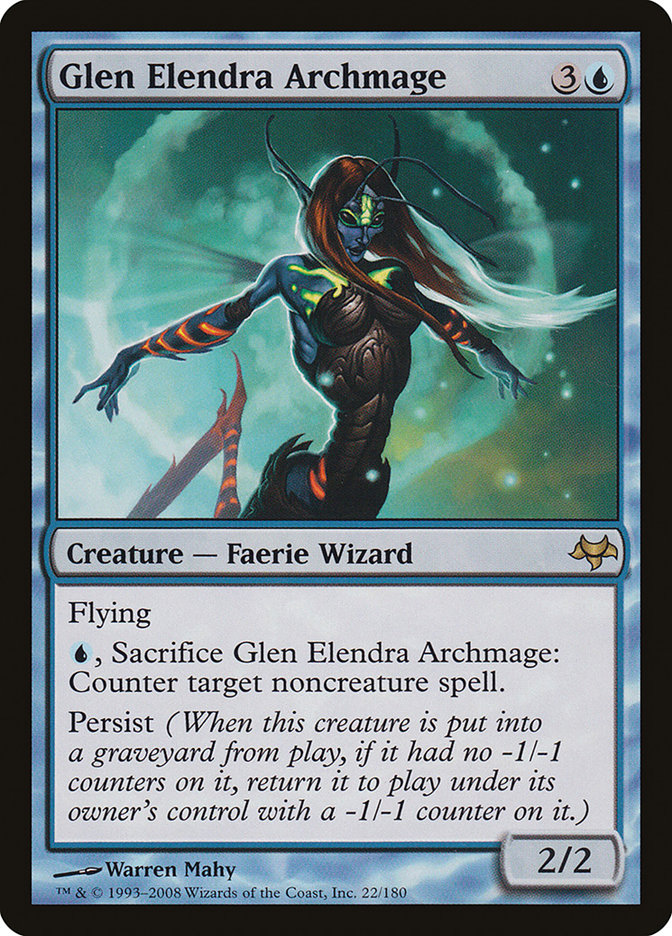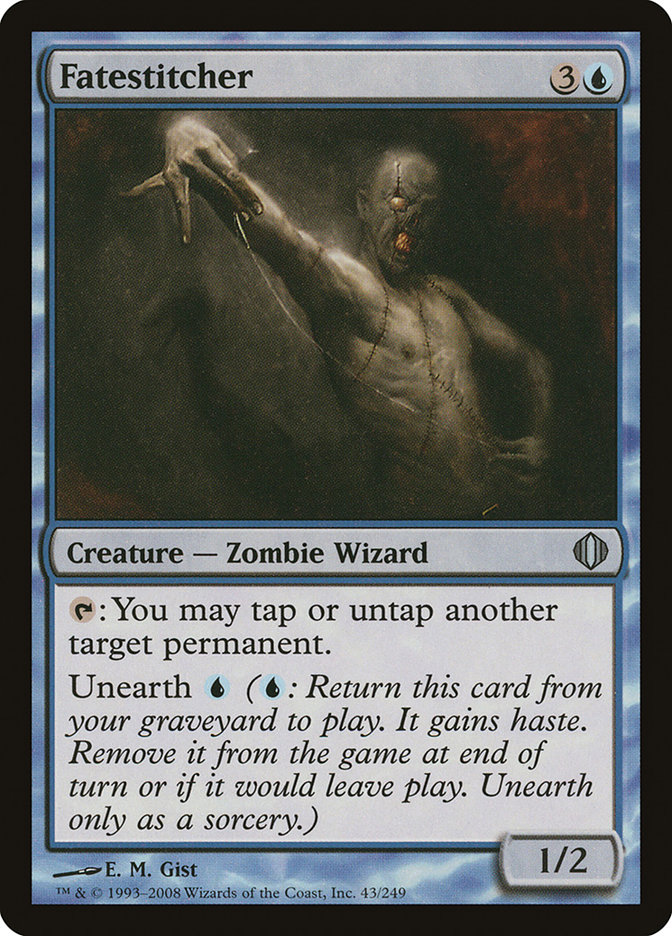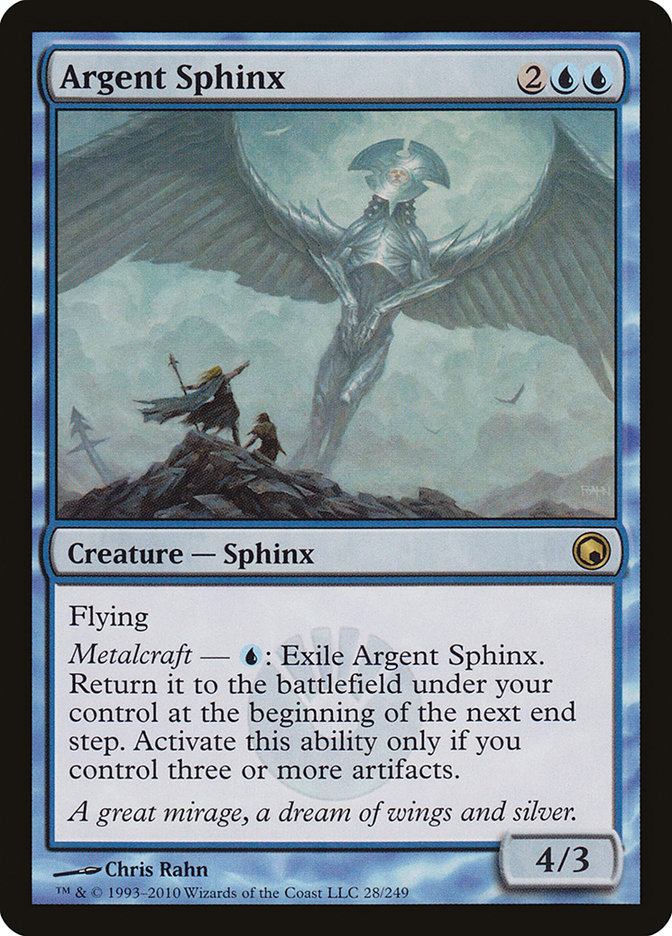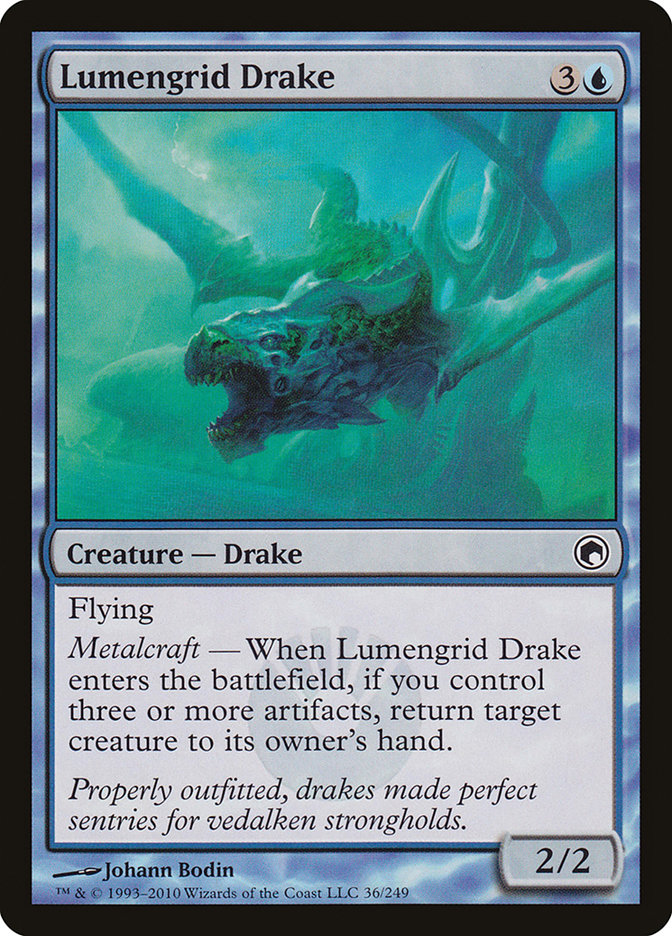Murk Strider MTG Card
| Mana cost | |
| Converted mana cost | 4 |
| Rarity | Common |
| Type | Creature — Eldrazi Processor |
| Abilities | Devoid |
| Released | 2015-10-02 |
| Set symbol | |
| Set name | Battle for Zendikar |
| Set code | BFZ |
| Power | 3 |
| Toughness | 2 |
| Number | 62 |
| Frame | 2015 |
| Layout | Normal |
| Border | Black |
| Illustred by | Chase Stone |
Text of card
Devoid (This card has no color.) When Murk Strider enters the battlefield, you may put a card an opponent owns from exile into that player's graveyard. If you do, return target creature to its owner's hand.
If you can see it, it's too late.
Cards like Murk Strider
Murk Strider emerges as a unique figure among Eldrazi in Magic: The Gathering. It shares traits with other process-oriented creatures, such as Mist Intruder. Both hinge on the ingest mechanic, but Murk Strider stands out with its ability to return a creature to its owner’s hand, an advantage when disrupting opponent’s plays. Mist Intruder instead prioritizes board presence with flying.
Eldrazi Skyspawner is another relation, offering similar processing benefits while creating additional value with a spawn token that can be used for mana ramping or blocking. Murk Strider lacks this token generation but compensates with its direct creature bounce effect.
Then comes Ulamog’s Reclaimer, another processor with a sturdier form that recycles spells rather than affecting creatures. It lacks the immediacy of Murk Strider’s creature bounce but can reclaim powerful instants or sorceries, offering a different tactical approach. Comparatively, Murk Strider provides a quicker disruption tool.
Each of these Eldrazi presents unique strategies, but Murk Strider’s peculiar blend of processing and creature bounce carves a distinct niche within Magic: The Gathering’s vast array of options, especially in decks built around the ingest and process mechanics.
Cards similar to Murk Strider by color, type and mana cost
Card Pros
Card Advantage: Murk Strider offers a situational yet valuable form of card advantage with its exile-return mechanism. By strategically bouncing an opponent’s creature to their hand, you can disrupt their plans and set them back on the board. Although Murk Strider doesn’t directly draw you cards, removing key components of your opponent’s strategy can provide an edge akin to gaining extra cards yourself.
Resource Acceleration: While Murk Strider doesn’t provide traditional resource acceleration like ramping or treasure creation, it plays a role in accelerating your board state’s effectiveness. By resetting potential blockers or important creatures, it can clear the way for your attacks, potentially leading to quicker victories. It further synergizes with the ingest mechanic, allowing for process triggers that can indirectly affect resource acceleration.
Instant Speed: The processing ability of Murk Strider can be triggered at instant speed if another effect allows you to exile a card from an opponent’s graveyard at that time. This reactive usage gives you flexibility to wait for the most opportune moment to disrupt your opponent’s strategy during their turn, before they can utilize returned cards from exile or recover from the tempo loss.
Card Cons
Discard Requirement: One of the downsides of playing Murk Strider is the prerequisite to have a card exiled. Without an exiled card, its enter-the-battlefield ability, which can be crucial in gameplay, fails to trigger. This makes its inclusion in a deck heavily reliant on this specific game mechanic, potentially limiting its versatility.
Specific Mana Cost: Murk Strider demands a very specific mana alignment to cast—two colorless and one blue. This necessity can be restrictive, as it may not fit seamlessly into decks that don’t consistently produce both types of mana, potentially affecting its playability in multi-colored or colorless-centric themes.
Comparatively High Mana Cost: With a four-mana cost for a 3/2 creature, Murk Strider may be considered inefficient compared to other creatures in the same mana range. While its ability to bounce an opponent’s creature is potentially beneficial, players could find more cost-effective or more powerful options available, diminishing the practicality of Murk Strider in competitive play.
Reasons to Include in Your Collection
Versatility: Murk Strider offers a flexible role in decks that exploit the exile zone, serving as both an attacker and a temporary solution for problematic creatures. Its interaction with exile makes it useful in a variety of Eldrazi-themed decks or any build that routinely exiles cards.
Combo Potential: With its ingest ability, Murk Strider works well with strategies designed to benefit from processing cards that have been exiled. It integrates seamlessly into combos that require returning exiled cards to the owner’s graveyard, making it a key piece in complex interplays.
Meta-Relevance: In a meta that sees a significant amount of graveyard interaction and exile mechanics, Murk Strider could disrupt opponents’ plans while providing a creature on the board. Its relevance grows in formats where Eldrazi or exile themes are prominent.
How to beat
Murk Strider presents itself as a nuanced utility creature in the realms of Magic: The Gathering. Its primary ability triggers when it enters the battlefield, returning target creature to its owner’s hand if there’s a card with the ‘devoid’ ability in your graveyard. Subtly powerful, it can disrupt your opponent’s board by bouncing key creatures and delaying their strategy.
To effectively counter Murk Strider, one could utilize graveyard hate cards to ensure there are no cards with the devoid ability available for recursion. Cards like Rest in Peace or Relic of Progenitus can keep graveyards clean, making Murk Strider’s ability irrelevant. Another strategy includes maintaining countermeasures for enter-the-battlefield effects, such as with Torpor Orb, which nullifies such abilities altogether.
Defense is crucial when playing against a deck featuring Murk Strider. Keep your guard up with instant-speed removals like Path to Exile or Fatal Push to remove the Murk Strider before it can capitalize on its enter-the-battlefield effect. Ultimately, while Murk Strider can provide tactical advantages, being armed with the right counter-strategies in your MTG deck can ensure its impact on the game is minimized.
Where to buy
If you're looking to purchase Murk Strider MTG card by a specific set like Battle for Zendikar, there are several reliable options to consider. One of the primary sources is your local game store, where you can often find booster packs, individual cards, and preconstructed decks from current and some past sets. They often offer the added benefit of a community where you can trade with other players.
For a broader inventory, particularly of older sets, online marketplaces like TCGPlayer, Card Kingdom and Card Market offer extensive selections and allow you to search for cards from specific sets. Larger e-commerce platforms like eBay and Amazon also have listings from various sellers, which can be a good place to look for sealed product and rare finds.
Additionally, Magic’s official site often has a store locator and retailer lists for finding Wizards of the Coast licensed products. Remember to check for authenticity and the condition of the cards when purchasing, especially from individual sellers on larger marketplaces.
Below is a list of some store websites where you can buy the Murk Strider and other MTG cards:
 BUY NOW
BUY NOW BurnMana is an official partner of TCGPlayer
- eBay
- Card Kingdom
- Card Market
- Star City Games
- CoolStuffInc
- MTG Mint Card
- Hareruya
- Troll and Toad
- ABU Games
- Card Hoarder Magic Online
- MTGO Traders Magic Online
See MTG Products
Legalities
Magic the Gathering formats where Murk Strider has restrictions
| Format | Legality |
|---|---|
| Commander | Legal |
| Legacy | Legal |
| Paupercommander | Legal |
| Modern | Legal |
| Oathbreaker | Legal |
| Pauper | Legal |
| Vintage | Legal |
| Duel | Legal |
| Pioneer | Legal |
| Penny | Legal |
Rules and information
The reference guide for Magic: The Gathering Murk Strider card rulings provides official rulings, any errata issued, as well as a record of all the functional modifications that have occurred.
| Date | Text |
|---|---|
| 2015-08-25 | A card with devoid is just colorless. It’s not colorless and the colors of mana in its mana cost. |
| 2015-08-25 | Cards with devoid use frames that are variations of the transparent frame traditionally used for Eldrazi. The top part of the card features some color over a background based on the texture of the hedrons that once imprisoned the Eldrazi. This coloration is intended to aid deckbuilding and game play. |
| 2015-08-25 | Devoid works in all zones, not just on the battlefield. |
| 2015-08-25 | Face-down cards in exile are grouped using two criteria: what caused them to be exiled face down and when they were exiled face down. If you want to put a face-down card in exile into its owner’s graveyard, you must first choose one of these groups and then choose a card from within that group at random. For example, say an artifact causes your opponent to exile their hand of three cards face down. Then on a later turn, that artifact causes your opponent to exile another two cards face down. If you use Wasteland Strangler to put one of those cards into their graveyard, you would pick the first or second pile and put a card chosen at random from that pile into the graveyard. |
| 2015-08-25 | If a card loses devoid, it will still be colorless. This is because effects that change an object’s color (like the one created by devoid) are considered before the object loses devoid. |
| 2015-08-25 | If a replacement effect will cause cards that would be put into a graveyard from anywhere to be exiled instead (such as the one created by Anafenza, the Foremost), you can still put an exiled card into its opponent’s graveyard. The card becomes a new object and remains in exile. In this situation, you can’t use a single exiled card if required to put more than one exiled card into the graveyard. Conversely, you could use the same card in this situation if two separate spells or abilities each required you to put a single exiled card into its owner’s graveyard. |
| 2015-08-25 | If a spell or ability requires that you put more than one exiled card into the graveyard, you may choose cards owned by different opponents. Each card chosen will be put into its owner’s graveyard. |
| 2015-08-25 | If the target creature becomes illegal before the triggered ability resolves, it won’t resolve and none of its effects will happen. You won’t “process” a card in exile. |
| 2015-08-25 | Other cards and abilities can give a card with devoid color. If that happens, it’s just the new color, not that color and colorless. |
| 2015-08-25 | Players can respond to the triggered ability, but once it starts resolving and you decide whether to put a card from exile into the player’s graveyard, it’s too late for anyone to respond. |
| 2015-08-25 | You can’t look at face-down cards in exile unless an effect allows you to. |
